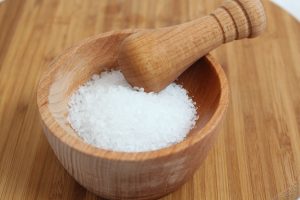 When you come to Prime Fitness in Totowa, New Jersey, we focus on your exercise needs to help your body function at its best. That doesn’t mean our personal trainers ignore the role that a healthy diet plays. Some of our clients have asked if they should eliminate salt. The answer for that question is that your health care professional will know what’s best for you. However, reducing your intake of salt and sugar can play an important role in your health. Too much of either isn’t good and can drive up your blood pressure, plus play other roles in deteriorating your health.
When you come to Prime Fitness in Totowa, New Jersey, we focus on your exercise needs to help your body function at its best. That doesn’t mean our personal trainers ignore the role that a healthy diet plays. Some of our clients have asked if they should eliminate salt. The answer for that question is that your health care professional will know what’s best for you. However, reducing your intake of salt and sugar can play an important role in your health. Too much of either isn’t good and can drive up your blood pressure, plus play other roles in deteriorating your health.
New studies show that maybe salt is not really the culprit.
You need salt in your diet. In fact, one study showed that people consuming fewer than 2300 mg a day—the minimum daily requirement, had a higher mortality rate than those that consumed more. Salt helps improve insulin sensitivity, sea salt acts like a natural antihistamine and it can reduce adrenaline spikes. Salt can improve sleep quality, plus maintain the proper pH of stomach acid. Salt can help balance your hormones and iodized salt is important for thyroid functioning. With all that said, you can get too much salt and that’s not good either.
Salt sensitivity may be part of the problem.
Salt sensitivity may also be the reason there’s so many studies that disagree. Not all people benefit from lowering salt in their diet. One study showed that high sodium intake was also an indication of a poor diet. The study showed that it was the lack of other nutrients, such as vitamins and minerals, that accounted for high blood pressure. Other studies show that people in their 40s and older could improve blood pressure with low salt diets. Salt sensitivity makes the difference. People of color and obese people benefit the most from salt restriction. Three classes of people are the most prone to vitamin D deficiency, which is linked to high blood pressure, people of color, obese individuals and seniors.
Start eating healthier and you’ll naturally get less salt.
Most processed foods contain high amounts of sugar and salt. It helps give back flavor to highly processed foods. Eating more whole foods not only boosts your nutritional intake, it also reduces your intake of salt. You can use herbs to add flavor and keep salt on hand to use sparingly. Unless your doctor directs otherwise, there’s no need to completely ban salt from your diet, but simply use it more sparingly.
- Salt can help if you have an allergic reaction. It can help with congestion, hay fever and runny nose. Put a little salt on the end of your tongue if you’re having those symptoms, let it be absorbed then rinse. Normally symptoms disappear quickly. Salt and a glass of water can also work for hay fever.
- Eliminating processed meat, such as smoked fish, sausage, ham, bacon and canned meats can reduce your salt intake dramatically. Use egg salad, chicken or tuna to replace it on sandwiches.
- Have snacks ready for those times you need a little extra. Instead of salty, crunchy chips, try crunchy celery and hummus or whole fat Greek yogurt and frozen black cherries to substitute for something sweet. Only use whole fat yogurt, since low fat has additives to make it more palatable.
- Make sure you get adequate potassium. Potassium helps flush excess sodium from the body. It works better than water. It relaxes vessel walls, lowering blood pressure. Bananas, sweet potatoes, avocados and spinach are all good sources of potassium.
For more information, contact us today at Prime Fitness Studio
